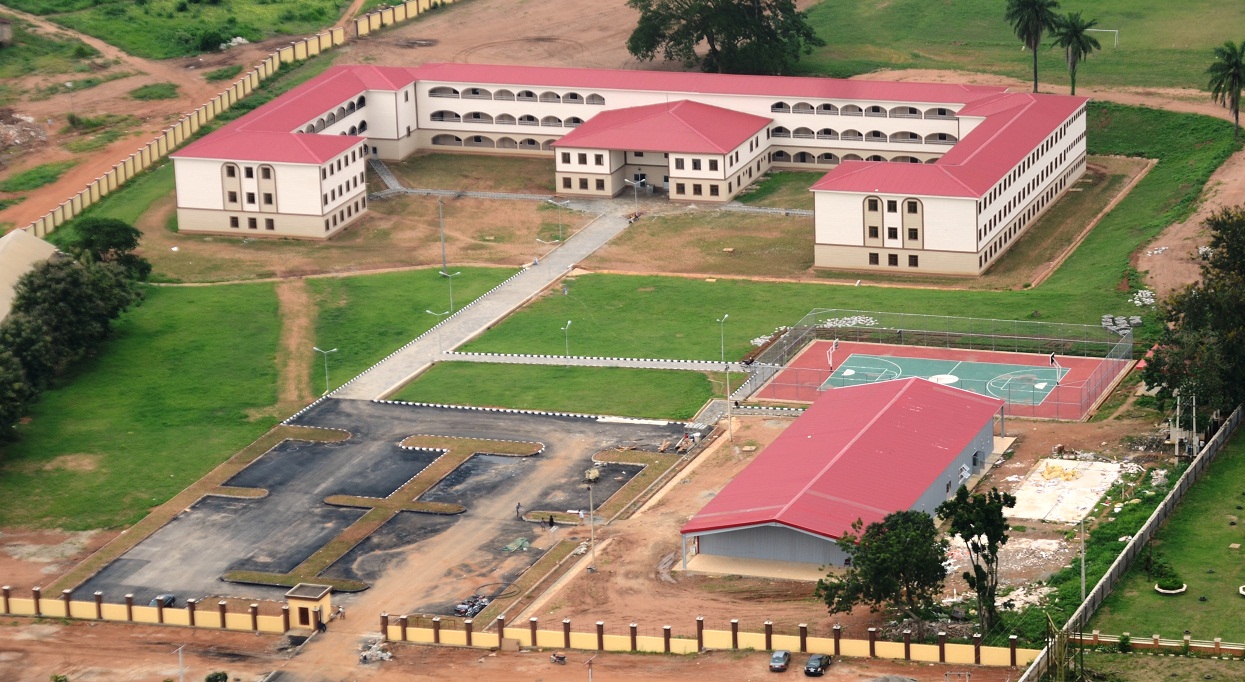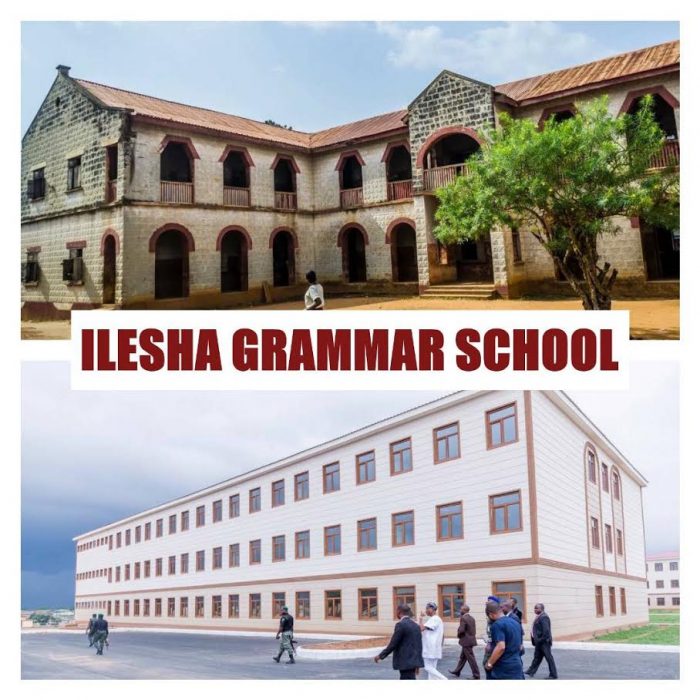

Osogbo Government High School commissioned by President Muhammudu Buhari on September 1st, 2016
BOTH politics and partisanship have crept into Osun education system. Of all the areas of governance, education sector has consistently been the leading area of discourse by political actors and analysts.
POLITICS is different from partisanship; so many people who played politics are not politicians, or perhaps, partisan politicians. American political scientist, Harold Lasswell, defined politics as “who gets what, when, how.” Politics is fundamental to human condition, it also involves all the actions of government and all the people who work for, serve, or challenge it.
Partisanship, on the other hand, according to Brian Duignan, a Senior Editor at Encyclopedia, is a “strong adherence, dedication, or loyalty to a political party—or to an ideology or agenda associated with a political party—usually accompanied by a negative view of an opposing party.”
Both politics and partisanship have crept into Osun education system. Of all the areas of governance, education sector has consistently been the leading area of discourse by political actors and analysts. Successive administrations in Osun State initiated one or two policies that make or mar the sector. It must be noted that most of the recent policies in the education sector were because of political conflicts.
Realising the damage of playing politics with education could cause, late French politician and advocate of Living Latin, Jean Capelle had warned: “Education must keep itself beyond the reach of political conflicts and party struggles in order to place itself objectively at the service of all families…..”


The National Secretary of the Nigerian Union of Teachers, Dr. Mike Ene, had also in 2020 warned governments to stop playing politics with education. He noted that “playing politics with education by successive administrations, especially post-Civil War, has had grave consequences on the sector, including the teaching profession.”
Osun education system was, and is still at the centre of politics. The administrations of Ogbeni Rauf Aregbesola and Mr. Adegboyega Oyetola in the state have made interventions in the education sector with pleasant and unpleasant results years after. The current administration of Senator Ademola Adeleke, is about to unleash obviously new education policies on the state. Adeleke administration held a three-day summit which was concluded yesterday to have a fresh breath into the education sector. The summit, according to the Commissioner for Education, Dipo Eluwole, was borne out of the need to reposition the education sector for development and functionality. Eluwole, in a text of a press conference address last week Friday stated that: “Available records have it that the state is rated as being the most poorly rated in public examination performance index which puts Osun state among the last three in the nation for some time now. The state is also having the largest out-of-school children in the south-west Nigeria and probably the least in adequate teacher-pupil-ratio. These are descriptions that were alien to the State education sector in the past, because the founding fathers bequeathed a befitting education legacy to the State.
“Osun education sectorial problems are quite hydra-headed and except an overhaul sectorial reform is taken fast, it could become irredeemable. That is why the state 2023 education summit is not only desirable but also timely.”
That was the second summit on education in the state. The Aregbesola’s administration had between February 7 and 8, 2011 held an education summit at the Osun State University Auditorium. The summit, chaired by Prof. Wole Soyinka, had the theme: “Resolving the Education Crisis in Osun State: Bridging Analysis and Implementation Gaps”. It also had sub-themes, viz: “Resolving the Education Crisis in Osun State”, “Quality Assurance and Capacity Building”, “Role of Stakeholders”, “Early Childhood and Basic Education”, “Funding Approaches”, “Curriculum Implementation for Functional and Entrepreneurial Education” and “Special Education and Language in Education”.
Aregbesola had said the summit was a comprehensive and holistic response to a scandalous educational rot he met in the state at the inception of his government, declaring it as unbefitting of a state and people that were part of the first revolutionary educational policy in Nigeria.
The summit birthed reforms and policy like restructuring of education administration modality, reclassification of schools, construction of mega and modern schools, same school uniform, introduction of tablet of knowledge – Opon-Imo, a new approach to teachers’ welfare and that of other non-teaching staff, among others. The reforms were not without strong criticism and threats. But Aregbesola’s administration sailed through the storm.
Before the end of Aregbesola’s eight years in office, 11 high schools with 876 classrooms for high school students were built. Only the Iwo High School building was not functioning as of November 27, 2018. A total of 28 new story buildings of middle schools consisting of 764 classrooms, 21 quadrangle buildings of elementary schools consisting of 531 classrooms were also constructed. Also, 143 blocks of between two and 10 buildings consisting of 1,550 classrooms, mainly for rural settlements were built, while rehabilitation of 215 old school buildings to produce 1,213 classrooms across the state was also achieved. The administration also employed 3,230 teachers on merit in 2013 into public schools. This was followed by the introduction of Opon-Imo to secondary school students.
Apparently, the reforms brought about remarkable improvement in the public education. Before Aregbesola’s emergence in 2010, the highest performance of Osun public school students in West African Examination Council (WAEC) was 15.68%. The state had recorded 10.91 in 2006, 6.86% in 2007, 10.11% in 2008, 13.98% in 2009, 15.68% in 2010, 21.9% in 2011, 22.21% in 2012, 20.54% in 2013, 18.55% in 2014 and 21.64% in 2015, according to reports by the National Bureau of Statistics.
The performance of the state improved to 45.5% in 2016 with a short decline of 43.50% and 40.85% in 2017 and 2018 respectively. However, there was laudable improvement in 2019 May/June WAEC performance as the state recorded 50.16%.
Aregbesola’s reforms in education was more appreciated when a student of Osogbo Government High School Osogbo, Akintade Abdullahi Akanbi, emerged winner of the year 2020 Young Nigerian Scientists Presidential Award Competition. Akintade adorned the venue of the award presentation where he received the handshake of President Muhammadu Buhari as then was with the self-same unified school uniform.
Commenting on the Osogbo High School building, Akintade said: “The school is indeed a model school in terms of structure and content. It has nice structures and the teachers here are very competence and professional. They are doing great work to ensure the students here get the best of education. The science laboratory here is well equipped and has helped me to build more on both theoretical and practical aspect of my education. The school standard is the best. You can never see a structure like this in both private and other public schools in the state. Without being boastful, you can hardly find this type of school anywhere in the country. It is not only about the structures, probe deeper and you would discover we have good teachers too. The school is better than private schools.”
However, Aregbesola’s successor, Oyetola, who served as his Chief of Staff for eight years, embarked on a review of Aregbesola’s education policies with a two-day roundtable summit on February 20, 2020. Consequently, Oyetola reversed all the education policies put in place by his predecessor; leaving alone Opon-Imo which had been withdrawn from the secondary school students. He returned the schools to their former status before the administration of Aregbesola. The secondary school students were returned to their former schools with no new buildings. Findings showed that the Oyetola administration did not build a single classroom during its four-year tenure.
The reversal of the policy led to depopulation of the modern schools constructed by Aregbesola. Oyetola had earlier sacked the consultants engaged for the maintenance of the schools. In an interview with OSUN DEFENDER last weekend, Prince Dare Eluyemi, the Managing Director of El-Samirad Facilities Services Limited, one of the consultants engaged for the maintenance of the schools, said they were sent packing by Oyetola without any tangible reasons. “We ran the project efficiently until the administration of Governor Gboyega Oyetola stopped the payment for the maintenance of the schools on political grounds. I guess he had political differences with his predecessor whose administration engaged us”, said Eluyemi.
According to some educationists, the education policy reversal embarked upon by Oyetola had no positive impact in the quality of education in the state. Their submission came on the heel of poor performance of secondary school students of the state in external examinations.
READ ALSO: FULL TEXT: Governor Adeleke Addresses Citizens, Residents On Osun @32
OSUN DEFENDER noted that Osun state declined from 2019’s 50.16% in WAEC performance to 4.78 in 2020 and 32.55 in 2021, according to NBS’s reports.
Osun was also rated the state with highest number of out of school children in the South-West, according to the 2021 Multiple Indicator Cluster Survey (MICS-6), a National Bureau of Statistics data, supported by the United Nations Children’s Fund (UNICEF). Explaining the survey last year, UNICEF Social Policy Specialist, Muhammad Okorie, said 14.88 per cent male children in Osun and 11.5 per cent female, making 13 per cent average rate, were out of school in the state.
This is a sharp retrogression for the state. The National Bureau of Statistic (NBS) had in 2013 rated Osun as the state with highest number of primary school enrollment in Nigeria, and the state with lowest index of unemployment in the country. In the 2013 school year, the overall rate of children enrolled in primary school was 95.2 per cent (95.8 per cent for boys and 94.6 per cent for girls). No fewer than 200,000 children of school age were enrolled in public elementary schools in the state in 2013/2014 academic session. Before Aregbesola’s emergence, Osun was ranked second state with highest number of out of school children in the federation in 2009. The state had witnessed low enrollment turn out in primary schools until the debut of Elementary School Feeding and Health programme of the Aregbesola administration. The programme, no doubt, spurred a great deal of parents and pupils into enrolling in public school in large numbers. But the programme, like other Aregbesola’s interventions in education sector, was badly hit with political vindictiveness.
Stakeholders have expressed concerns that the Adeleke administration’s summit will not bring about another confusion in the state education system.
However, the Governor, had while declaring the summit open on Tuesday, promised to give his best support to ensure that the state reclaims its top ranking in WAEC before the expiration of his first term.
He noted that his administration has identified education as the common heritage that good governance could bestow on its teaming citizenry.
Controversial Nigerian singer Darlington Okoye, popularly known as Speed Darlington, has been released from Kuje…
President Bola Tinubu has approved the establishment of a new Federal Polytechnic in Gwarinpa, Federal…
An operative of the Osun State Security Network, popularly known as Amotekun Corps on Tuesday…
Just two days after the tanker explosion, which killed 90 people and also left scores…
In the fight against financial crimes and terrorism financing, Nigeria has prosecuted over 100 terrorist…
Canadian Prime Minister Justin Trudeau has vowed to take a strong stance against the US…
This website uses cookies.